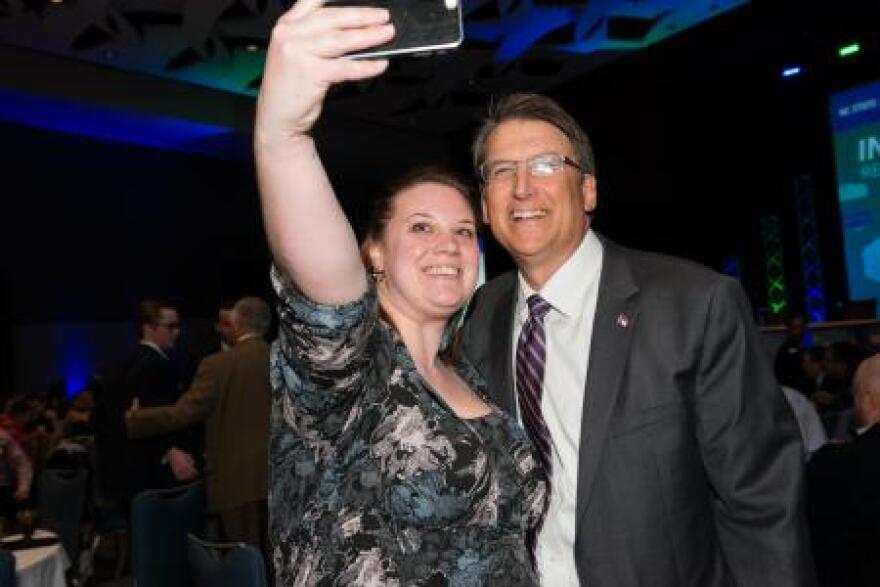Governor Pat McCrory was Monday's guest on Charlotte Talks. The interview comes at a time when the Republican governor is at odds with state lawmakers, particularly Republicans in the Senate, on a number of key issues. These include taxes, business incentives and the state’s budget.
Now disagreements between legislative leaders and the governor are nothing new, even when the branches are controlled by the same party. But their criticisms of each other have become more pointed and more public.
And it has some wondering if Governor McCrory is repositioning himself politically in preparations for an expected 2016 re-election campaign.

Where a politician fits on the political spectrum isn’t simply defined by party affiliation. Pat McCrory is a Republican. But he was also the longtime mayor of heavily Democratic Charlotte.
So, in 2012, job one for gubernatorial candidate McCrory during the primary season?
"He had to prove that he was conservative enough for base Republican voters," says UNC Charlotte political scientest Eric Heberlig, "There were suspicions of him as a big-city mayor that he had been involved in some big spending projects in Charlotte such as the arena, such as the light rail."
So McCrory had to prove he wasn’t a R.I.N.O. (Republican in Name Only). His political message shimmied slightly to the right. That, says Heberlig, is because heavily partisan voters are those most likely to turn out in the primaries. "So like many politicians, he had to modulate his message a bit between the primary and general elections a bit because he’s appealing to different audiences."
By the general election, McCrory moved back to his natural political position, says Republican political advisor Larry Shaheen.
"He was an urban moderate. That’s how he ran. He ran as someone who was going to get things done," Shaheen says.
McCrory was the GOP candidate, but in campaign ads like this one he eschewed political labels and parties:
https://www.youtube.com/watch?v=D3LBjXvdT7c
Let's forget about politics for a while. And think about us. That’s what we tried when I was mayor. People of all parties built our city into an economic powerhouse.
And he reinforced his moderate credentials during a gubernatorial debate with a one-word answer to this question from WRAL's Laura Leslie.
https://www.youtube.com/watch?v=XJkGj_SbpbU
LL: If you’re elected governor what further restrictions on abortion would you agree to sign. I’ll start with you Mr. McCrory. PM: None (long silence). LL: Alright (crowd laughs).
"He presented himself as a kind of classic, moderate, North Carolina statewide politician," says political scientist Michael Bitzer of Catawba College.
And the moderate strategy worked on Election Day. McCrory won with by more than 11 points. That victory was in part due to a surprising large number of swing voters says Bitzer. "He had about 18 percent Democratic support which is fairly unheard of in this polarized environment we’re in."
Now this trip down election memory lane is important for two big reasons. The first, is what happened when McCrory became governor. "The General Assembly was passing all this pretty staunchly conservative legislation," says Eric Heberlig, adding that McCrory, "was signing off on it. Wasn’t objecting loudly to it. When he did object, there didn’t seem to be a lot of compromise that moved it in a more moderate direction."
All this pleased North Carolina’s Republicans. But Democrats and some moderates were enraged. And they no longer saw Pat McCrory in the political middle but firmly to the right. That’s something Michael Bizter believes the governor is aware of.
"I think what he has come to realize is that perhaps he has been tarred with the conservatism particularly of the state senate."

Which leads us to reason number 2: It was a moderate Pat McCrory that was elected in 2012, and being perceived as a moderate may be the only way McCrory can be re-elected.
"North Carolina is a very purple state," says Heberlig, "and moderates and independents are going to decide the outcome of the election." Michael Bitzer agrees. "We’re pretty much a divided state, probably 45-45 split between Democrats and Republicans. So you’re talking about maybe 15 percent that are truly undecided that could swing one way or another."
Which is why Bitzer believes public fights with the legislature are a sign McCory may be shifting. "The differentiation with the legislature will start to portray him as being much more in the center than necessary on the right of the spectrum."
And those fights are more public. Take this recent comment from Governor McCrory over the Senate’s proposal to redistribute sales tax revenue:
"I believe it will cause great harm to the economic engines of this state," Governor McCrory told a crowd last week. "We cannot afford to have this bill passed in North Carolina."
Heberlig doesn’t see these fights so much as a shift to center by McCrory, but as part of a broader political tactic. By not standing in the way of conservative legislation early in his term, McCrory was fending off a potential political challenge from farther right.
"If he would have come out right away and started vetoing all this legislation from the General Assembly, he would have just been inviting a primary challenge when he ran for re-election," says Heberlig.
Republican Larry Shaheen disagrees with both Heberlig and Bitzer. He believes McCrory has never shifted on the political spectrum. "While Pat McCrory seems at this point to be coming out further to the middle. Instead, what’s happening is issues are now starting to come up that highlight his more urban moderate approach."








